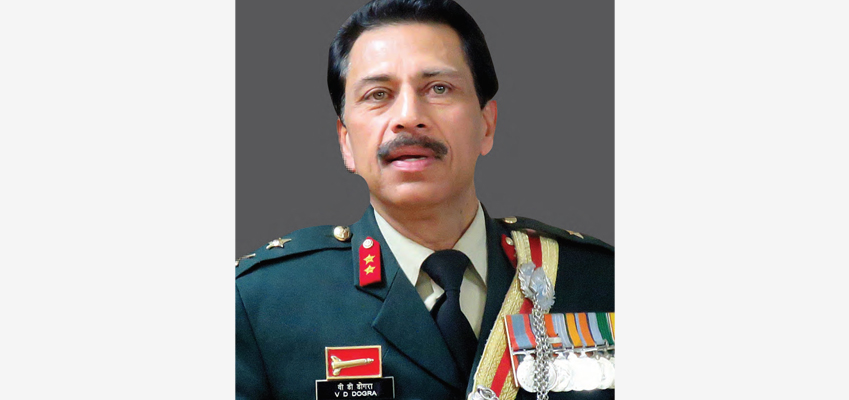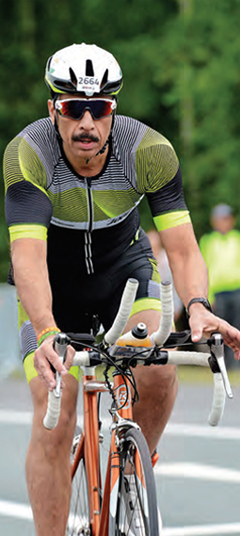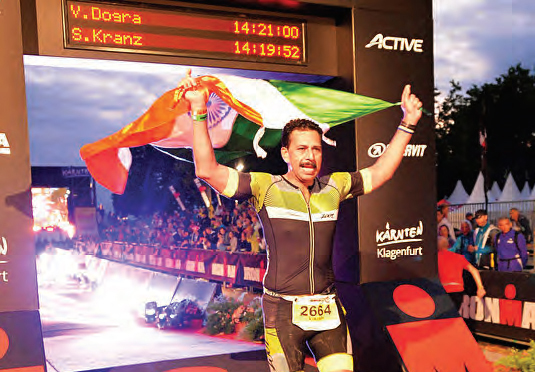The Ironman of India

At the formidable age of 58, Major General Vikram Dev Dogra became the first serving Indian Army Officer and the only General in the world to complete Ironman Austria in a record-breaking time of 14 hours and 20 minutes. He outdid himself at Ironman Germany by completing the arduous event in just 13 hours and 40 minutes. A recipient of the Sword of Honour and President’s Gold Medal at the IMA, Major General Vikram Dev Dogra is now spending his time inspiring people post-retirement from the Indian Armed Forces. In an interview with Corporate Citizen, he sheds light on his journey as the ‘Ironman of India’. Having served as the Director General Resettlement (DGR), he speaks at length about the transition of military personnel into the corporate world
Corporate Citizen: Tell us about your role as the DGR.
Major General Vikram Dev Dogra: DGR is responsible for the resettlement of Officers, JCOs and other ranks post-retirement from the Indian Army, Navy and Air Force. To seek resettlement through the DGR, one has to qualify as an ex-serviceman. A large number of officers retire from the Armed Forces annually. A set of QRs have been laid out that make the officers eligible to avail the benefits offered to ex-servicemen, for instance, serving for a certain period in the Armed Forces or not being cashiered on disciplinary grounds.
CC: In which corporate capacity are the Army personnel a good fit?
Most Jawans and JCOs, are disinterested in the corporate. Having served in field areas away from the family for a long tenure and rightfully earned a pension, they are mostly on the lookout for career avenues that allow proximity to home. Post-retirement, their preference is for a job that is not taxing and gives them a reasonable amount of money. Speaking of Officers-not more than 10-15% want to join corporate-this comprises mainly of officers who took pre-mature retirement.
CC: What are the courses offered by the DGR to prepare the personnel opting for pre-mature retirement for a corporate role?
The DGR runs six-month courses that prepare officers with skills that help them be a good fit for the corporate. The DGR course is tailormade for the Armed Forces. This course is run in institutes like the IIMs. Roughly, 200 officers sign up for these courses every six months. Most of them, however, start their venture.
CC: How does the corporate sector perceive ex-servicemen?
Unfortunately, the corporate sector mostly stereotypes Army officers in security roles. But the officers are competent to take up jobs in all fields like Logistics, Human Resource, and Administration.
CC: How does the DGR facilitate the retired Army personnel?
The DGR has three schemes in place-there is a scheme that facilitates them to run a security agency. Another scheme gives them the impetus to look after a CNG pump. In fact, the CNG pumps around NCR are all manned by Defence Services Officers. Next, there is coal transportation. There are, I would say at least at any given point in time, about a thousand-odd officers running these schemes. However, there is a limitation on how long you can run it, that is, 60 years. As far as the men are concerned, these security agencies are run by the officers. The men who assume the role of Security Guards. So, that is how the DGR looks after men getting employment.
In the coal scheme, the transportation company is owned by the officers. Five officers unite and form a company but the tipper trucks which are used are owned by jawans, who get a loan to buy them. Thereafter, they earn a monthly remuneration from the truck. This is how the DGR is running these schemes while getting them jobs.
CC: What does resettlement mean?
The concept came about because Army Officers retire before the age of sixty. A Colonel retires at the age of 54 and should he not seek reemployment in the Army, for the next six years he is eligible for the DGR schemes. A Brigadier retiring at the age of 56 can get it for a maximum of four years. A Major General can get it for two years. A Lieutenant General, doesn’t get anything because he retires at the age of sixty.
CC: What are the extraordinary skills that military personnel bring to the corporate table?
Discipline and loyalty, integrity and versatility. In the Forces, we face new situations every day. Additionally, every two years they are shifting to a new milieu. We have a new job profile with each posting. Thus, the versatility of addressing new situations and new skills is much higher amongst Defence Service personnel. Armed forces personnel are easily trainable and adapt well. They also look at the self-esteem, dignity, confidence that Armed Forces personnel have. The qualities I just enumerated are for HR roles.
The Armed Forces personnel from all technical backgrounds and skills are highly sought-after in the corporate. That apart, military personnel are very adept at human resource management (HRM) since from the time they join the Forces, they are Commanders looking after men, their growth, their training, their well-being and promotions.
"Armed forces personnel are easily trainable and adapt well. They also look at the selfesteem, dignity, confidence that Armed Forces personnel have"
CC: What is your advice for officers looking to shift from the Forces into the corporate?
When they take this decision to make the switch, they must take it well before the time that they will be actually quitting the Forces. That way, the transition can become smooth with preparation. The way forward is to do the right kind of courses-whether they are to give you exposure of the industry or to enhance your qualifications for the corporate world
Should you need to undertake a survey on the kind of business that you want to initiate-take adequate time to decide. It is only then that you will not regret moving into a new world.
CC: How did you develop an interest in Triathlons?
Triathlons are a recent phenomenon in India. The first triathlon was held in Delhi in 2013. It was organised by a person who used to arrange cycling events. I was very excited to see this new format and registered for it. Though it was a very small triathlon that comprised of five hundred metres of swimming, twenty kilometres of cycling and five kilometres of running, it was a formidable challenge for me. I was very pleasantly surprised when I came second despite being the oldest participant and that’s when I realised that it’s something I can do well at.
Thereafter, I was posted out of Delhi and life went on as it does in the Army. You move from one assignment to the other and get caught up in a quagmire of things. It was in 2014 that I came upon a YouTube of a woman called the Iron Nun. She was a practising nun in the USA and had been introduced to running by a priest when she was 48. At the age of 52 she did the Ironman and she took on and successfully completed forty of them. She did her last event when she was 68. I was deeply moved and inspired by her. But it was like a dream that did not happen because of the rigours of my job.
In 2015, when I was posted once again to Delhi I was at a stage in my life when I found that the challenges around me were non-existent. But I am a man who needs a challenge every day of his life. That’s when I recalled seeing the Iron Nun video and decided that this would make an appropriate challenge.
"My most intimidating experience was when I went for the registration. I was exposed to athletes from 70 different countries. They were superbly fit, most with many Ironman events under their belt"

CC: How did you prepare yourself mentally for these events?
Ninety nine per cent of the people around me discouraged me saying I was too old. Most people with whom I shared my dream would laugh at me. They said I would get a heart attack. My biggest challenge was to convince myself that I can do the Ironman at the age. I also did public pledging where I took to social media and announced I was doing the Ironman. When I did that that I put my reputation at stake effectively cutting off routes of escape.
My wife was always there supporting my decision. Not once did she ever discourage me from doing the Ironman. My announcement must have raised eyebrows. Everyone compliments you but there are always indications to show that everyone is not convinced.
CC: How did you prepare yourself physically for the challenge lying ahead of you?
In 2017, I was posted to Mathura as Chief of Staff and I remember that it was January 17, (my birthday), and my wife had presented me a fancy iPod. Listening to music on it was the first time I ran seven km on the treadmill. I was very excited as I did my run and I remember ringing her up to thank proudly telling her of my achievement. I realised that if I was to do the Ironman which had very intimidating distances to be covered, I needed to run longer, and I decided I will run at least 10 km. The training was the most difficult part because you need to swim 3.8 kilometres, cycle 180 km and run for 42.2 km and I had not even run a half marathon.
I broke it up into smaller goals starting with 10 kilometre run at Mathura, I would increase it to fifteen kilometres. Similarly, I started by swimming 500 meters gradually increasing the distances. I did immense body and core strengthening and that’s how I trained for almost one and a half years. In March 2018, I got posted to Delhi, where I had the facility of a fifty-metre swimming pool. I also had the Expressway between Noida and Greater Noida where I could cycle. It was a difficult endless journey filled with experiences ranging from happiness, disappointment and anxiety.
CC: How did you fit a demanding fitness schedule into your regular duties as an Officer?
I was DGR at Delhi and had a 9 am to 5:30 pm job. An important assignment that I could not compromise on. This took away my 10 hours from the 24 hours leaving me with 14 hours to rest. If I took away eight hours of sleep I had to juggle with the balance of six hours to do everything else including training. Training for the Ironman needs long hours as it takes between one to two hours to swim 3.8 km, four to five hours to run 42 km and six to seven hours to cycle 180 km. I would get back from work, change and on the weekdays from 7 pm to 10 pm I would run thrice a week and swim twice a week. I would leave the cycling for the weekends. So, on a Saturday night, I would cycle from 2 am on a Saturday to 7 am on a Sunday. Night cycling though risky, gave me the advantages of lesser traffic on the road, lesser pollution and no sun because we were now in the month of April, May, June, which is build-up to the Ironman. On Sundays, I would catch up with sleep.
My sacrifices came in terms of my social and family life. I stopped socialising and began to refuse all invites. If you wake up at 1 am for a cycling ride, the whole household gets disturbed. Thus, time management is the most difficult part.
CC: Once you established yourself as the Ironman, how did the response of those around you change?
It was overwhelming. I received innumerable messages, calls and friend requests on social media. After my event, I had proceeded on a ten-day vacation in Europe and little did I realise that the news of my completing the Ironman was going viral in India and I became a known name overnight.
When I returned to India, I had a posse of officers from my unit and my office who had come to receive me at 2 am. That was embarrassing. The next day when I went to the office, I saw a lot of people outside the office and asked my driver if there was a strike going on. I was shocked when he said they were officers and staff from office, waiting with garlands and bouquets.
That morning there was a high tea organised by the Secretary in the Ministry where I was felicitated. The Army also responded by the Chief of Army Staff inviting me to his office to congratulate me followed by the Defence Minister.
"I didn’t have a nutritionist or a trainer but I did a lot of research on nutrition and hydration. It’s a fine calculation to understand how many calories one is consuming"

CC: Please share a memorable anecdote from a Triathlon.
I landed in Austria five days before the event to acclimatise and practice on the route. The first ride shocked me becasue of the inclines and I was horrified that my cycle was not climbing. We had to gain elevation of 6000 feet in that 180 kilometres of cycling and I was having a problem negotiating them. I went to the first cycle shop I saw and got my gear set changed to one more conducive to climbing.
Then the weather packed up and the temperature that was forecast to be around 25 degrees dropped to 19. It became cold and there was no way I could swim without a swimsuit. I had to buy one and then practice in it in the remaining two days as swimming in a wet suit is totally different than swimming without one. Luckily, there was a lake near the property where I was staying, so I got an opportunity to acclimatise in the suit.
My most intimidating experience was when I went for the registration. I was exposed to athletes from 70 different countries. They were superbly fit, most with many Ironman events under their belt. I was once again left doubting myself.
The environment was like attending a carnival where the town of Klagenfurt comes on the streets from seven in the morning to midnight. Each time you pass them, they shout your name to cheer you. Very hospitable and very encouraging environment. That did charge me up a bit, though when you have been on the move all day very little inspires you. You are trying to pull up all the reserves that you have. That’s where your attention is and most of the time and you don’t even hear people cheering you. It feels good though, smiling itself needs a huge effort at that time.
During my cycling, an interesting incident happened. I was one hundred and fifty kilometres into my cycling, all my energy had sapped going up the huge inclines. Only 30 km were left but I was so low that the road started to go blur. I was getting a blackout-feeling giddy. Visions of my quitting started to come to mind and I was close to panic. That is when I got magically transported and connected with my mother. She had passed away five years ago and suddenly I could see her face clearly. She was smiling at me and egging me on. I had goosebumps and felt a huge surge of energy. I started to get my cycling rhythm back and completed the thirty kilometres easily. Later upon research, I realised that I had gone into a meditative mode. This had happened with a few athletes during endurance events. That’s when I realised you can meditate during endurance runs or cycling.
CC: Since the triathlons are so demanding, what was your nutrition like?
I didn’t have a nutritionist or a trainer but I did a lot of research on nutrition and hydration. It’s a fine calculation to understand how many calories one is consuming and then workout what is the food type and how often you need to eat. There is also a limitation on the number of calories you can consume through your food. So, I realised I need to take supplements thrice a day. All this comes through experimenting with different foods and quantities and took me about three months to work out a plan. The food you choose should be easily digestible by you and enjoyable. Foods like beetroot, coconut water, amla became part of my diet. Multivitamins like zinc, magnesium, potassium and chlorides became my focus. I was consuming 1.7 grams of protein per body weight in kilograms. But I would advise people to do their own research and consult a nutritionist.
The most important thing is how you nourish yourself on race day. All the blood goes to your muscles then digestion becomes a challenge. So, if you eat solids during an endurance event there is a good chance you might suffer from bloating and vomiting. You have to restrict yourself to either liquid or semi-liquids. There are a number of energy drinks and protein gels that you can use for the race day.
CC: What’s keeping you busy now?
I am only re-attired and busier now. I am a motivational speaker and take talks for institutions. I am also the Goodwill Ambassador of the Kho-Kho Federation of India. I am also training for the next Ironman which I hope to do at the age of 62 when the pandemic eases out. I am also writing a book about the Enigma of Mental Endurance. My second TED talk was also on this topic.